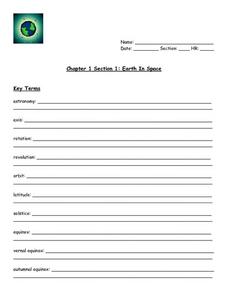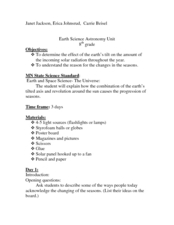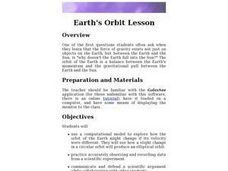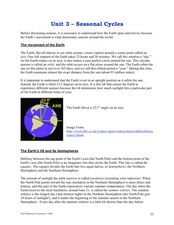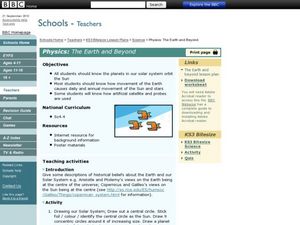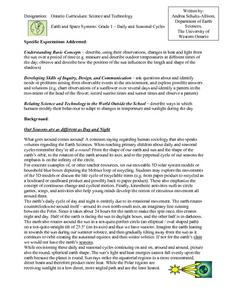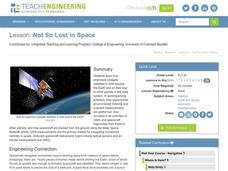Curated OER
Day and Night
Inform your elementary scientists why we experience day and night. They are provided with facts and explanation as to why the day and night cycle occur, discuss what they've learned with a partner, and are then given the task of writing...
Space Awareness
Climate Zones
The climate at the equator is hotter than the climate at the poles, but why? The lesson goes in depth, explaining how the angles of illumination relate to the heating rate at different latitudes and seasons. Scholars use a strong lamp,...
Curated OER
Earth in Space
In this reason for the days and nights on earth worksheet, students study the reasons the Earth has days and nights by answering 28 questions about earth's rotation, the equator, the relationship between the sun and moon, and the earth's...
Curated OER
Let the Sun Shine!
Students investigate how the sun can be used for energy. They read a handout, discuss the pros and cons of passive solar building design, develop flashcard questions, and identify jobs that can be helped by solar energy.
Curated OER
Earth Moon Scaling
A wonderful lesson incorporating math and physics skills along with specific details about the planetary bodies. The cross-curricular approach makes for a valid activity to challenge multiple ages and abilities. Your class could work in...
Curated OER
Earth Science Astronomy Unit: Seasons on Earth
Eighth graders describe how the Earth's position causes seasonal changes. In this astronomy lesson, 8th graders explain how solar radiation varies depending on the season. They create a collage or poster on each of the Earth's four seasons.
Curated OER
Earth's Orbit Lesson
Tenth graders devise a computational model to explore how the orbit of the Earth might change if its velocity were different. Using accurately recorded data, 10th graders defend a scientific argument.
Curated OER
How Does Earth Move?
In this earth movement activity, students will fill in the blank of 4 statements relating to how the Earth spins on its axis and how it moves around the sun.
Curated OER
Measuring the Diameter of the Sun
High schoolers calculate and measure the diameter of the sun. They construct a meter stick instrument, calculate the diameter using a formula, and compare the measurement with the accepted scientific measurement.
Columbus City Schools
Experiencing Eclipses
Don't be caught in the dark! Young scientists investigate the causes of both solar and lunar eclipses using an interactive to help them understand the development of an eclipse over time. They then research facts and characteristics of...
Curated OER
Seasonal cycles
Students understand that the rotation of the Earth is responsible for the seasons. In this seasonal cycles lesson, students learn how the rotation of the Earth affects the seasons. Students answer questions about the rotation, the...
Curated OER
Seeing Solar Storms in STEREO-I
In this geometric calculations of solar storms worksheet, students use a diagram indicating the location of 2 STEREO satellites, the earth and the sun to calculate the distance between a Coronal Mass Ejection and the Earth. They use...
Curated OER
Reasons for Seasons
Students model the tilt of the Earth as it orbits the Sun. They explain the meaning and characteristics of solstices and equinoxes. They explain that sunlight hits the Earth at different angles at different locations over the course of...
Curated OER
Reasons for Seasons
Students investigate a model of the tilt of the Earth in its relationship to the Sun during the different seasons of the year. They study the solstices and equinoxes, while determining how sunlight hits the Earth with different angles in...
Curated OER
Unit 2 Sun & Stars
Students describe stellar objects using terms such as stars, planets, satellites, orbits and light. In this sun and stars unit, students research stellar objects through seven individual lessons discovering star characteristics, how...
University of Arizona
The Exotic Vacation
Students explain the concepts and vocabulary of Earth's rotation. They plan imaginary vacations based on the seasons in different locations. This is a very creative lesson plan, which students enjoy.
Core Knowledge Foundation
A Time for All Seasons - Winter
As the days get shorter and a chill enters the air, it's time to start teaching your little ones about the wondrous winter season. Through a series of teacher demonstrations, whole-class read alouds and discussions, and hands-on...
Curated OER
Solar Car Series: during What Part of the Day Can the Most Sun Power Be Collected?
In preparation for solar car races, middle schoolers attempt to discover what time of day the most solar energy can be collected. Begin by demonstrating the use of a voltmeter for measuring solar cell output. Take them outdoors to take...
Curated OER
Physics The Earth and Beyond
Fourth graders will explore our solar system. In this physics instructional activity students create a model of the solar system to explore the movement of Earth, the Sun, and stars.
Curated OER
Catching Some Rays
Sixth graders explore the tilt of Earth's axis. In this Earth instructional activity, 6th graders read a Greek mythology story explaining why there are seasons. Students build a sun-ray gathering tool from styrofoam, glue,...
Curated OER
Navigating a Spacecraft
Students work with a partner to plot the trajectory of a spacecraft traveling between Earth and Mars in the 2018 and returning in 2020. They examine the key factors when planning a mission to and from Mars such as travel time, distances...
Curated OER
TE Activity: A Roundabout Way to Mars
Learners investigate Hohmann orbit transfers using cardboard and string while focusing on the orbits of Earth and Mars. They look at the planets orbits around the sun and transfer orbit form one planet to another to determine what a...
Curated OER
Science: Daily and Seasonal Cycles
First graders use their observations to describe daily and seasonal cycles. through a demonstration using a suspended ball and flashlight, they determine the time of day in various locations. Next, 1st graders participate in a...
Curated OER
Not So Lost in Space
Students investigate how engineers navigate satellites in orbit around the Earth and on their way to other planets in the solar system. They study vocabulary words and participate in studying a satellite by learning about times and...




